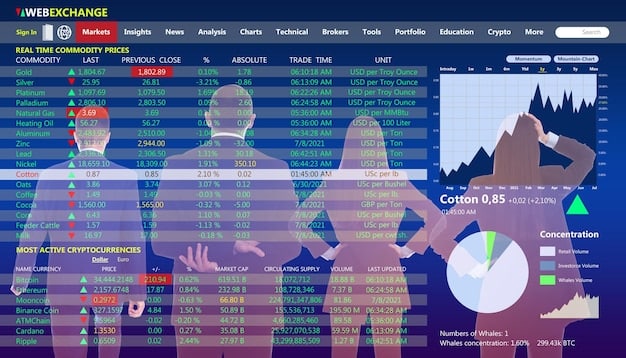Investing Basics: A Beginner’s Guide to Online Brokerage Accounts

Investing in the stock market can seem daunting, but online brokerage accounts provide a user-friendly platform for both beginners and experienced investors to buy and sell investments like stocks, bonds, ETFs, and mutual funds, making it easier than ever to grow your wealth.
Anúncios
Embarking on your investment journey? Understanding how to use online brokerage accounts is a crucial first step. These platforms empower you to actively participate in the market, buying and selling various investments. Let’s explore the investing basics: how to use online brokerage accounts to buy and sell investments, providing you with the knowledge to make informed decisions.
Understanding Online Brokerage Accounts
Online brokerage accounts have revolutionized the way people invest. They offer a convenient and cost-effective way to access the stock market and other investment opportunities. Unlike traditional brokerage firms, online platforms typically charge lower fees and provide a wider range of tools and resources for investors.
What is an Online Brokerage Account?
An online brokerage account is a type of financial account that allows you to buy and sell investments, such as stocks, bonds, mutual funds, and exchange-traded funds (ETFs), through an online platform. These accounts are typically offered by brokerage firms that operate primarily online.
Think of it as your personal gateway to the stock market, offering a user-friendly interface and a wealth of information to guide your investment decisions. It’s the place where you execute trades and manage your investments.
Key Features of Online Brokerage Accounts
Several features make online brokerage accounts attractive to investors:
- Low Costs: Most online brokers offer commission-free trading for stocks and ETFs, significantly reducing transaction costs.
- Extensive Research Tools: Access detailed market data, research reports, and analysis to help you make informed decisions.
- User-Friendly Platforms: Intuitive interfaces make it easy to navigate the platform and execute trades, even for beginners.
- Wide Range of Investments: Trade stocks, bonds, mutual funds, ETFs, options, and more, all in one place.
These features, combined with the convenience of online access, have made online brokerage accounts a popular choice for both new and experienced investors.
In conclusion, online brokerage accounts offer a powerful and accessible way to participate in the financial markets, providing investors with the tools and resources they need to manage their portfolios effectively.
Choosing the Right Online Broker
Selecting the right online broker is a crucial decision that can significantly impact your investment experience. With numerous options available, it’s essential to consider your individual needs and preferences to find the best fit.
Factors to Consider
When choosing an online broker, consider the following factors:
- Fees and Commissions: Look for brokers that offer commission-free trading for stocks and ETFs, as well as low fees for other transactions.
- Investment Options: Ensure the broker offers the types of investments you’re interested in, such as stocks, bonds, mutual funds, or options.
- Research and Tools: Evaluate the quality and availability of research reports, market data, and trading tools.
- Platform Usability: Choose a platform that is easy to navigate and use, especially if you’re a beginner.
Take your time to research and compare different brokers to find one that aligns with your investment goals and preferences.
Popular Online Brokers
Several well-known online brokers cater to a wide range of investors:
- Fidelity: Known for its extensive research tools and robust platform, Fidelity is a popular choice for both beginners and experienced investors.
- TD Ameritrade: Offers a wide range of investment options and powerful trading platforms like Thinkorswim.
- Charles Schwab: Provides comprehensive financial planning services and a user-friendly platform.
- Robinhood: A popular option for beginners, offering commission-free trading and a simple, mobile-first interface.
Each of these brokers has its own strengths and weaknesses, so it’s important to compare them carefully before making a decision.
In summary, choosing the right online broker requires careful consideration of your individual needs and preferences. By evaluating factors such as fees, investment options, and platform usability, you can find a broker that empowers you to achieve your financial goals.
Opening and Funding Your Account
Once you’ve chosen the right online broker, the next step is to open and fund your account. This process typically involves providing personal information, verifying your identity, and transferring funds into your account.
The Account Opening Process
Opening an online brokerage account is usually a straightforward process that can be completed online:
- Visit the Broker’s Website: Go to the broker’s website and click on the “Open Account” or similar button.
- Provide Personal Information: Fill out the application form with your name, address, Social Security number, and other required information.
- Verify Your Identity: You may need to provide a copy of your driver’s license or other government-issued ID to verify your identity.
- Choose Account Type: Select the type of account you want to open, such as an individual brokerage account, a Roth IRA, or a traditional IRA.
The broker will review your application and, if approved, you’ll be able to fund your account.
Funding Your Account
There are several ways to fund your online brokerage account:
- Electronic Bank Transfer (ACH): Transfer funds directly from your bank account to your brokerage account.
- Wire Transfer: Send funds electronically from your bank account to your brokerage account.
- Check: Mail a check to the brokerage firm to deposit funds into your account.
Once your account is funded, you’re ready to start investing.
In conclusion, opening and funding your online brokerage account is a simple process that sets the stage for your investment journey. By following the steps outlined above, you can quickly and easily get started with investing.
Understanding Different Investment Types
A key aspect of successful investing is knowing the different types of investments available through your online brokerage account. Each investment comes with its own level of risk and potential reward.
Stocks
Stocks represent ownership in a company. When you buy a share of stock, you become a part-owner of that company.
Bonds
Bonds are essentially loans you make to a company or government. They pay a fixed interest rate over a specified period.
Mutual Funds
Mutual funds pool money from many investors to buy a diversified portfolio of stocks, bonds, or other assets.
The importance of understanding various investment types can not be overstated. It allows for diversification and understanding your risk level, so you can select investments that align with your risk tolerance.
ETFs (Exchange-Traded Funds)
ETFs are similar to mutual funds but trade like stocks on an exchange. They offer diversification and can be bought and sold throughout the day.
Understanding different investment types enables you to make informed decisions and build a diversified portfolio that aligns with your financial goals.
Placing Your First Trade
Placing your first trade can be an exciting yet nerve-wracking experience. With a clear understanding of the process and a well-thought-out strategy, you can approach your first trade with confidence.
Step-by-Step Guide
Here’s a step-by-step guide to placing your first trade:
- Log into Your Account: Access your online brokerage account using your username and password.
- Find the Security: Use the search bar to find the stock, ETF, or other investment you want to trade.
- Enter Your Order: Specify the quantity of shares or the dollar amount you want to invest.
- Choose Order Type: Select the type of order you want to use, such as a market order or a limit order.
- Review and Submit: Double-check your order details and submit the trade.
Remember to start small and gradually increase your trading size as you gain experience.
Example Scenario
Let’s say you want to buy 10 shares of Apple (AAPL) using a market order:
- Log in: Log into your online brokerage account.
- Find AAPL: Search for “AAPL” in the search bar.
- Enter Order: Enter “10” in the quantity field.
- Choose Order Type: Select “Market Order.”
- Review and Submit: Review the order details and submit the trade.
With this information, you can effectively place your first trade.
Tips for Successful Investing
Successful investing requires patience, discipline, and a long-term perspective. By following a few key principles, you can increase your chances of achieving your financial goals.
Key Principles
Keep these essential tips in mind:
- Diversify Your Portfolio: Don’t put all your eggs in one basket. Spread your investments across different asset classes, industries, and geographic regions to reduce risk.
- Invest for the Long Term: Avoid trying to time the market or chasing short-term gains. Focus on long-term growth by investing in quality assets and holding them for the long haul.
- Stay Disciplined: Develop a clear investment strategy and stick to it, even during market downturns. Avoid making emotional decisions based on fear or greed.
- Continuously Learn: Stay informed about the market and the economy. Make a habit of reading books, articles, and reports to enhance your investment knowledge.
By following these principles, you can build a solid foundation for long-term investment success.
In addition, take the time to educate yourself and manage your money effectively.
| Key Point | Brief Description |
|---|---|
| 💡 Select the Right Broker | Choosing a suitable online broker is significant for trading and investment experience. |
| 💰 Account Funding | Different Options are available for funding your account, like ACH transfer, wire transfer. |
| 📈 Diversification | Diversifying a portfolio across multiple sectors can improve returns. |
| 🗓️ Focus on Long Term | Avoid making short-term investment moves to ensure the long run returns. |
FAQ Section
An online brokerage account is a platform that allows you to buy and sell investments such as stocks, bonds, and ETFs over the internet, providing a convenient way to manage your portfolio.
Consider factors such as fees, investment options, research tools, and platform usability to find an online broker that aligns with your investment needs and preferences.
You can generally trade stocks, bonds, mutual funds, ETFs, options, and other investment products through most online brokerage accounts, depending on the broker’s offerings.
Log into your account, search the asset you want to trade, enter your order details, confirm the order, and submit it through your online brokerage platform.
Diversify your investments, invest for the long term, stay disciplined with your strategy, and continuously learn about the market and economy to make educated investment decisions.
Conclusion
Mastering the basics of using online brokerage accounts is a critical step toward achieving your financial goals. With the knowledge gained from this guide, you can confidently navigate the world of investing and take control of your financial future.







